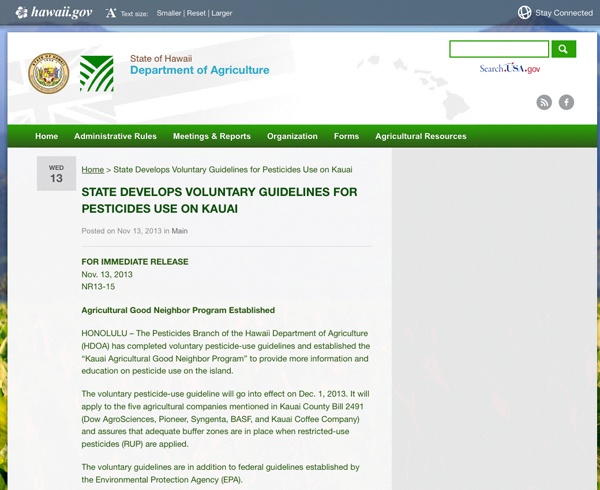LIHUE — Kauai’s largest agricultural companies have shared how much restricted use pesticides they applied in December. Wednesday marked the deadline for the companies to comply with the first round of filings through the voluntary Kauai Agricultural Good Neighbor Program,
LIHUE — Kauai’s largest agricultural companies have shared how much restricted use pesticides they applied in December.
Wednesday marked the deadline for the companies to comply with the first round of filings through the voluntary Kauai Agricultural Good Neighbor Program, and Syngenta, Dow AgroSciences, DuPont Pioneer, Kauai Coffee and BASF all hit the deadline.
Some of the companies used hundreds of gallons or pounds of pesticides over hundreds of acres.
Some didn’t use any RUPs at all.
Others applied amounts that barely broke single digits.
But what do the numbers mean? It depends on whom you ask.
“What you’re seeing is a snapshot in time,” said Thomas Matsuda, head of the state DOA pesticide division, on the RUP reports listed on the state website.
That snapshot, the director said, is more of a gauge of what’s being used, and not a document that will spell out when too much RUP is being used, or too often.
That’s because different RUPs have different use requirements, as spelled out on their labels.
Generally, Matsuda said, RUP maximum thresholds are not to exceed a certain per acre, per year standard. So just saying some acres were sprayed with a certain amount of pesticides, as the reports currently state, isn’t pinpointing whether the same acre is being sprayed with the RUP repeatedly.
That’s why the Good Neighbor documents don’t go far enough, said Andrea Brower, a concerned Kauai citizen who favors the county’s more stringent pesticide law over the voluntary program.
“That’s really the crux of it … It’s just not adequate information,” she said. “The bottom line is, it’s not very, I mean, it’s interesting to see the numbers, but it’s not the information or data that we need for any useful analysis.”
But what the disclosures can do is allow the DOA’s pesticide division to monitor the RUPs and amounts, and if something triggers a red flag, the department can use its expertise to follow up, Matsuda said.
“If there’s a complaint or a concern, we can ask for a year’s worth of records on a certain product,” he said of the state department that certifies RUP applicators every five years to ensure the pesticides are being properly administered. “We’ve done it in the past.”
Two of the affected companies, Syngenta and Kauai Coffee, said Wednesday that the state’s new voluntary program will probably need some fine-tuning.
Paramount is making the information easily understandable for the community, they said, and just throwing numbers up without application regulations could be uninformative when it comes to the whole picture — or worse, misleading.
So what can be done moving forward to make the info easier to comprehend?
“After looking at the website and reading the TGI article, we were discussing exactly (that question),” Mark Phillipson, Syngenta spokesman, wrote in an email to The Garden Island. “What do a bunch of numbers mean? Without context it is difficult for anyone to determine. We plan to discuss (the) matter with HDOA to ensure community members understand the information and have context for it. As we continue to state that ‘the label is the law’ we do indeed follow all label instructions and directions regarding usage.”
Wayne Katayama, Kauai Coffee president, said his company submitted its report Jan. 10, which reported the company didn’t use any RUPs in December.
The voluminous application guidelines, amounts and techniques Kauai Company submits to the state for compliance inspectors could be too detailed for the public to wade through, so finding a happy medium to share with people on what the RUP numbers mean could be the next step in the new program.
“I think what you need to do is let the program percolate enough and see what kind of feedback it gets,” he said. “Again, we’re trying to (work with the community).”
• Tom Hasslinger, managing editor, can be reached at 245-0427 or thasslinger@thegardenisland.com.


